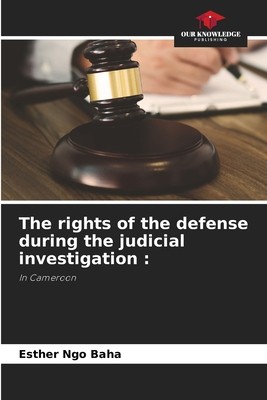
- We will send in 10–14 business days.
- Author: Esther Ngo Baha
- Publisher: Our Knowledge Publishing
- ISBN-10: 6205626616
- ISBN-13: 9786205626610
- Format: 15.2 x 22.9 x 0.9 cm, softcover
- Language: English
- SAVE -10% with code: EXTRA
The rights of the defense during the judicial investigation (e-book) (used book) | bookbook.eu
Reviews
Description
The promulgation of Law No. 2005/007 of July 27, 2005, establishing the Code of Criminal Procedure is sufficient proof of the recognition and adoption of international standards relating to fundamental rights in Cameroon. At the same time, this law places criminal procedure at the heart of the major debates in society. Indeed, the new organization of the procedure gives a particular relief to the preparatory phase of the trial. Now subject to judicial control, this phase is marked by the reintroduction of new measures for the protection of the rights of the defense during the judicial investigation. The purpose of this study is to examine the consecration and guarantee of the rights of the defense during judicial information in Cameroon. If this study has revealed a recognition of the rights of the defense during judicial information in Cameroon, it has also allowed us to pronounce on both the technical and practical limits of the new legislative work.
EXTRA 10 % discount with code: EXTRA
The promotion ends in 15d.21:09:24
The discount code is valid when purchasing from 10 €. Discounts do not stack.
- Author: Esther Ngo Baha
- Publisher: Our Knowledge Publishing
- ISBN-10: 6205626616
- ISBN-13: 9786205626610
- Format: 15.2 x 22.9 x 0.9 cm, softcover
- Language: English English
The promulgation of Law No. 2005/007 of July 27, 2005, establishing the Code of Criminal Procedure is sufficient proof of the recognition and adoption of international standards relating to fundamental rights in Cameroon. At the same time, this law places criminal procedure at the heart of the major debates in society. Indeed, the new organization of the procedure gives a particular relief to the preparatory phase of the trial. Now subject to judicial control, this phase is marked by the reintroduction of new measures for the protection of the rights of the defense during the judicial investigation. The purpose of this study is to examine the consecration and guarantee of the rights of the defense during judicial information in Cameroon. If this study has revealed a recognition of the rights of the defense during judicial information in Cameroon, it has also allowed us to pronounce on both the technical and practical limits of the new legislative work.


Reviews